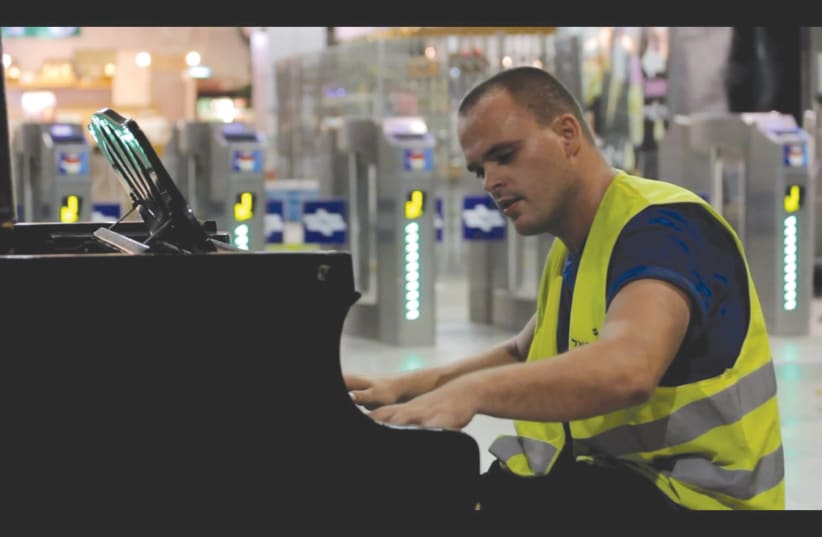Following its premiere, it will be shown throughout the month of April at the Tel Aviv Cinematheques and other cinematheques around the country. The film had its world premiere at the Docaviv International Film Festival in 2020 and was selected for the Biarritz FIPADOC film festival. It was also selected as a candidate to the Best Documentary Prize 2020 by the Documentary Forum of Filmmakers.
Music, it turns out, is a great equalizer. Soldiers and civilians, Jews and Arabs, men and women, young people and the elderly, Ashkenazim and Mizrahim, religious and secular, immigrants and native-born Israelis all sit down to play. And an enormous number of them play with great talent and intensity, in virtually every style of music there is. Even those who are far from being professional musicians are charming and engaging.
In one particularly arresting moment, a soldier who looks to be of Ethiopian descent plays a rousing jazz improvisation as an older Ashkenazi man looks on in fascination. Few of the pianists play exactly what you would guess they were going to. As the passersby stop to play, others stop to watch and listen, while many more ask the station information clerk questions, argue with a guard or simply rush past.
“What surprised me most, at the end of the day, is that you don’t know who the music is going to come from,” he said.
Yagoda, who has made documentaries on a number of offbeat subjects such as hospice care, said he discovered this subject by chance when his daughter lost something on a train and he went to the Israel Railways Lost and Found at that station. He noticed the piano for the first time when a soldier sat down to play classical music. Besides the beauty of the music, another thought occurred to him. “He was in a private world in a public place,” said Yagoda.
“I was interested in how people react to each other, so I didn’t speak to anyone who played, I just let them sit down,” said Yagoda. The cameras were relatively far away and there were microphones placed in the piano. “We wanted to bother them as little as possible.”
As soon as they finished playing, though, “I ran after them to get permission.” Sometimes it was a real race, because, as Yagoda noted, “When do people stop playing and go? When it’s time for their train. So I ran with them to the train.”
Most of the piano players did give their permission, although a few, mostly soldiers declined. But in the end, the documentary, which was filmed over the course of two years, features the people who tell the non-linear story of the life of one of Israel’s busiest train stations.
“I wanted to see what music gives to the place,” he said. “Sometimes in a place where you think nothing is going to happen, something happens.”
What happens in the film are intense – if brief moments of connection between the musicians and the instrument, the players and the passersby. Told that I found myself wondering about the life stories of the musicians in the film – where they were from, where they studied music, where they were going – Yagoda was pleased.
“The film turns you into an autodidact,” he said. “You make up stories about them in your head.”
It’s rare to see a movie that truly changes the way you see the world, but Tuning will do that for many viewers. Yagoda said he hoped it would encourage people to take off their headphones, stop for a minute and listen to something they were not expecting to hear.
